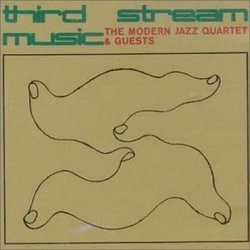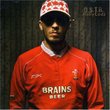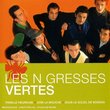| All Artists: Modern Jazz Quartet Title: Third Stream Music Members Wishing: 1 Total Copies: 0 Label: Wounded Bird Records Original Release Date: 1/1/2002 Re-Release Date: 4/2/2002 Genres: Jazz, Pop Style: Cool Jazz Number of Discs: 1 SwapaCD Credits: 1 UPCs: 664140134522, 075670134546, 075678134241 |
Search - Modern Jazz Quartet :: Third Stream Music
 | Modern Jazz Quartet Third Stream Music Genres: Jazz, Pop
One of the group's first combinations of jazz and classical. It features guest appearances by Jimmy Giuffre & Jim Hall. This album is making its worldwide CD debut thanks to Wounded Bird Records. Remastered. 2002. |
Larger Image |
CD DetailsSynopsis
Album Description One of the group's first combinations of jazz and classical. It features guest appearances by Jimmy Giuffre & Jim Hall. This album is making its worldwide CD debut thanks to Wounded Bird Records. Remastered. 2002. Similar CDs
|
CD ReviewsYes, Robert, finally on CD! Robert E. Feder | 01/18/2004 (5 out of 5 stars) "I wore out the LP and hadn't been able to find a replacement. I'm like Robert Feder. "Third Stream" has always been my favorite MJQ album. Now at long last, as Robert says, it's available as a CD. The music isn't just jazz with strings in the background. This is a genuine integration of jazz with "serious concert music." If you're primarily a jazz buff, don't let the blend put you off. The Beaux Arts String Quartet will enchant you, and the MJQ is at its quietly funky best here, pumping out insistent, driving, infectious rhythms and sparkling virtuoso jazz improvisation. The lively "Sketch" is my favorite cut." A must-have for your instrumental jazz collection D. Gordon | Portland, OR USA | 08/16/2005 (5 out of 5 stars) "Of all the albums by the Modern Jazz Quartet, this is the best. This album has passed the test of time over decades with the quality of its instrumental compositions, played by the best musicians at the top of their play, who are recorded with superior stereo separation. This is a go-to album for sophisticated jazz that is good listening. Both together and broken out, the various parts are fascinating. The album has intimations of the classical with the use of strings. This is not a play at high-volume, pumped up energy album. This is cool, a bit high-brow, a classy album in its own time." Dramatic insight to jazz and chamber music J. Holmes | yokohama, japan | 01/23/2006 (5 out of 5 stars) "wow. a stunningly accomplished album of cerebral jazz. truly unlike any other jazz that i have heard. there is a strong classical music sound in these pieces, a bit like chamber music. but bustling and flowing with astute jazz sense. the compositions don't come outright and strike the listener with their genius and flair; rather, these pieces slip inside the unused portions of your brain and settle in quietly and deeply and affect you from the inside out. a unique, challenging, and rewarding listening experience that demands many, many spins to fully comprehend and enjoy. Third Stream Music is a magical and mysterious recording that is inspirational and only grows better over time."
|

 Track Listings (5) - Disc #1
Track Listings (5) - Disc #1


